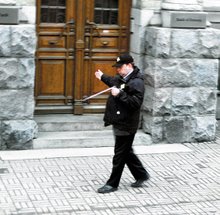GT200
Southerners got 'training' after tests by dodgy device
By PRAVIT ROJANAPHRUK
THE NATION
Published on February 3, 2010
Further doubt was cast on the efficacy of the controversial GT200 explosive detector yesterday when panelists at a symposium at Chulongkorn University's Faculty of Science concluded it was almost certainly a "hoax" and urged people in society to be more scientifically minded.
Meanwhile, Chulalongkorn molecular biologist Jessada Boripant, who "exposed" the device purchased by both the Thai Army and police, said an independent body was needed to avoid similar problems with future purchases of complicated technological equipment.
"I think [it's not intentional corruption] but ignorance. It's a great hoax. Our society doesn't question it as long as the users appear. Our society relies on superstition," Jessada told The Nation.
The scientist said he and colleagues in the Wahkor Internet Scientific Group would closely monitor the upcoming examination process of the GT200 bomb detector and if something unusual occurred they would let the public know.
At the symposium, Tiraphan Wilaithong, a physicist from the Centre for Excellence in Physics, said there was only a "one out of a billion or out of 10 billion" chance the GT200 would function as intended.
Asst Prof Pong Srongpong, a physics lecturer at Chulalong-korn, said producers of GT200 relied on fancy words such as diapara magnetism, which, he thought "has nothing to do with detecting process".
He attacked claims that the device had a detection range up to 700 metres as farfetched. "My God! This 700 metre range is out of this world!" he said.
Kwarn Seetathanee, director of National Institute of Technology (Nectech) had a similar view, saying the probability of such a device working was almost nil. "Diapara-magnetism? Very improbable."
The panel urged the Ministry of Science and the Environment to test the device and claims about its efficacy. However, they refused to say what should be done to avoid similar problems in the future, claiming they only sought to offer academic knowledge.
Angkhana Neelapaijit, head of the Working Group on Justice for Peace, claimed 400 Thai-Malay Muslims had been forced into "occupational training" by the Army after they were wrongly detected with traces of explosives by the GT200.
She said it was long overdue to find out if the device was reliable or not.
Angkhana showed a letter to The Nation detailing how local residents were suddenly picked up and taken for forced training for four months after the GT200 device found they had been involved with bombs without any further evidence.
"Officials used the detector then they took us to vehicles," part of a text by a person affected by use of the device in the deep South stated.
-----------------------------------------------------------
From The Bangkok Post:
Ministry tests reliability of bomb detector
Abhisit wants findings to help remove doubts
Published: 3/02/2010 at 12:00 AM
Results of tests on the GT200 bomb detector conducted by the Science and Technology Ministry will be released within a week, minister Kalaya Soponpanich says.
Khunying Kalaya said a meeting would be called today to form a panel to devise the tests.
The cabinet is concerned about the detector's reliability and consistency and invited soldiers, security experts and drugs officers to provide information on its use at its meeting yesterday.
The invited guests expressed satisfaction with the detectors but the cabinet wanted more academic research to support their claims.
Prime Minister Abhisit Vejjajiva said the tests should be concluded as soon as possible as the doubts about the detector were having an impact on the credibility of state agencies which use the device.
"As soon as the inquiry is completed, the government will decide [whether to continue to use the detectors]," he said.
The prime minister asked the public not to jump to conclusions about any corruption involved in the purchase of the devices as he had not seen the details of the purchases.
"At this stage we should not rush to conclude who should be blamed or who is responsible for the purchase of the devices until we know whether they are effective or not," Mr Abhisit said.
He said there were about 700 bomb devices in the country. Government records show most have been bought since 2006.
Scientists insisted yesterday the bomb-detection technology used by the GT200 was not based on recognised bomb scanning principles.
Speaking at a seminar on the scientific principles of bomb and narcotic drugs scanners hosted by Chiang Mai University's Centre of Excellence in Physics and Chulalongkorn University's science faculty, the centre's director, Thiraphat Wilaithong, said the operation of the GT200 was not based on any principles of physics.
Doubts about the GT200 emerged after BBC tests on the ADE651 device, which is almost identical to the GT200, showed they could not detect bombs.
Mr Thiraphat suggested that researchers should be supported to produce Thai-made bomb scanners based on electrochemical and biosensor technology.
He said researchers at the National Electronics and Computer Technology Centre were capable of developing such scanners.
Mr Thiraphat's suggestion was supported by Phong Songphong, a Chulalongkorn University physics lecturer.
Mr Phong said the GT200 scanning technology could not be explained by existing scientific principles.
Biosensor-based scanning devices or dogs could give more accurate detection results, he said.
-------------------------------
Bravo to Thailand for taking a close look at these fraudulent detectors and being strong enough to admit some officials may have not asked enough questions before buying the equipment. Will MEXICO be next? How many people must die in the drug wars before the government in Mexcow will conduct the same tests?



Keine Kommentare:
Kommentar veröffentlichen